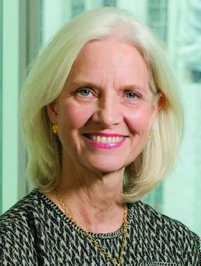
Abstracts are a major part of the research program at the ACR/ARHP Annual Meeting, and not just because there are more than 3,000 individual poster and oral presentations.
The research presented at the Annual Meeting includes the full range of basic, translational, and clinical research studies that are leading the field into the future.
“This meeting is the preeminent forum for the presentation of basic science studies that inform our understanding of the rheumatologic diseases,” said Mary K. Crow, MD, Physician-in-Chief and Chair of Rheumatology at the Hospital for Special Surgery in New York. “It is also an opportunity for presentation of the most recent data from clinical trials and clinical research.”
Dr. Crow heads the abstract selection subcommittee in basic science for the Annual Meeting Program Committee. Peer reviewers continue to examine and rank the more than 4,000 abstracts submitted for consideration this year. Late-breaking abstract submission opens in mid-September and closes in early October.
“We obviously don’t know what (late-breaking) abstracts or which clinical trials will be presented in San Francisco,” Dr. Crow said. “But there has been growing interest in studying therapeutic agents in some of the systemic diseases like lupus, vasculitis, and scleroderma. I wouldn’t be surprised if there were data from recent trials in these areas. It used to be that most of the clinical trial data were focused on rheumatoid arthritis. We now have a broader spectrum of rheumatologic diseases in which clinical trials take place and data are presented.”
Accepted abstracts will be published in an online supplement of Arthritis & Rheumatology in addition to being presented during the Annual Meeting and archived at acrabstracts.org. Attendees can pick and choose from more than 1,000 posters on display each day on Sunday, Monday, and Tuesday. A few dozen abstracts will also be offered each day as oral presentations.
Both oral and poster abstracts will be available for viewing at acrabstracts.org and in the 2015 Annual Meeting app, which will be available soon. Abstracts are grouped into 15 basic science categories, 24 clinical categories, and eight ARHP categories.
The basic science categories range from B-cell biology to T-cell biology. Clinical categories cover the gamut of rheumatologic conditions, from antiphospholipid syndrome to vasculitis. ARHP categories extend from clinical practice/patient care to research methodology.
New for 2015 are two basic science and clinical categories for reproductive issues in rheumatic disorders. Basic science topics include biologic mechanisms impacting fertility, pregnancy, or fetal outcomes. Clinical topics include the management of pregnancy and preconception planning, fertility, HPV infection and vaccination, medication management during pregnancy, and management of neonatal complications of maternal rheumatic disease.
Peer review is blinded, Dr. Crow said. That puts international researchers on an equal footing with domestic researchers and helps ensure that the best research is selected for presentation regardless of origin.
“Nobody can carefully read every poster that is presented on even one of those three days,” she said. “Every attendee has to make choices in selecting the poster categories and the individual posters that are important to their own work. And it’s always good to balance those with a couple of categories that are not your day-to-day focus but that you would like to keep up with just to keep things interesting.”
Finding specific posters is easy. Look for a map of the different topic categories inside the poster hall. Posters are arranged numerically within each category. Attendees who want help selecting the most important abstracts within a category can register for free poster tours each day posters are on display.
“A lot of people like poster tours,” Dr. Crow said. “Tour leaders select from the large number of posters that in their view are the most interesting and important, and they then give the poster presenter the opportunity to explain the research to the group. It is a useful mechanism to get a good grasp of important advances in particular categories.”
